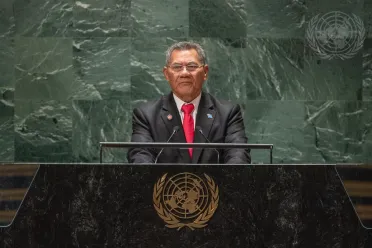Statement
Statement summary
KAUSEA NATANO, Prime Minister of Tuvalu, stressed that climate change — particularly sea level rise — threatens his country’s physical existence, lives, and livelihoods. As a low-lying island State, Tuvalu “cannot afford to take the back seat and spectate while others manoeuvre their own interest in our multilateral process” on climate change. He proposed establishing a coalition on sea level rise and existential threat to bring together like-minded States and stakeholders to protect statehood, sovereignty, territorial integrity, and livelihoods. He also called for other countries to join Tuvalu and other Pacific nations to negotiate a fossil fuel non-proliferation treaty to reduce reliance on fossil fuels, accelerate the just transition to renewable energy, and curb greenhouse gas emissions. At the national level, his Government developed a comprehensive long-term adaptation plan to elevate the country’s land territory and ensure a sustainable habitat for the population “well into the next century and beyond”.
Additionally, he urged all United Nations Members to submit endorsements of an advisory opinion regarding the obligations of States parties under the United Nations Convention on the Law of the Sea and Complementary Instruments to protect and preserve the marine environment from the effects of climate change — including ocean warming, sea level rise, and ocean acidification. This advisory opinion, before the International Tribunal for the Law of the Sea, is crucial in the pursuit of climate justice and the matter’s urgency cannot be overstated. “Justice delayed is justice denied,” he emphasized. He also reinforced the collective support for the United Nations resolution for an advisory opinion from the International Court of Justice to reinforce the international legal responsibility of States to safeguard the climate system. Through this effort, international law will “provide the moral punch to phase out fossil fuels and confront polluters to become responsible”.
Beyond Tuvalu, he called for the United Nations to ensure the participation of everyone worldwide, including the people of Taiwan. He urged for Taiwan’s meaningful participation in United Nations specialized agencies as a widely known partner that is trustworthy and willing to contribute to collective efforts on pressing global issues. Sadly, many people have not been given the same treatment of inclusivity, non-discrimination, and oneness of humankind that the United Nations must uphold. He also deemed it unfortunate that the Cuban people still endure economic hardships imposed by long-standing unilateral economic blockades that disregard human rights and go against principles of cooperation. “The decision to maintain these measures,” he continued, “has deprived Cuba of much-needed international development assistance and partnerships crucial for its recovery and future development.”
Regarding digital technology, he affirmed the vision of a digital revolution to ensure no one is left behind and that individuals and communities are empowered with knowledge, connectivity, and access to essential services. Adopting a “digital nation approach” can have a profound impact on resource and geographical challenges, enabling Tuvaluans to access education, health care, and economic opportunities that were previously out of reach. A digital transformation will be pivotal to harness progress, inclusivity and sustainability for Tuvalu. For both the global community and small island developing States like Tuvalu, embracing a digital transformation is crucial and will help bring innovative solutions to climate and environmental concerns.
Full statement
Read the full statement, in PDF format.
Photo

Previous sessions
Access the statements from previous sessions.
